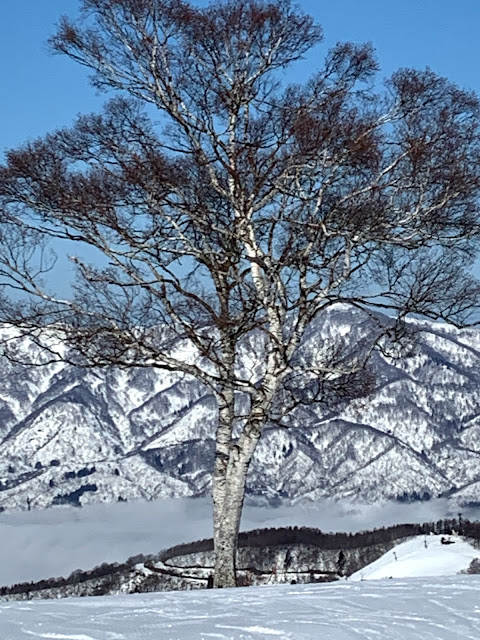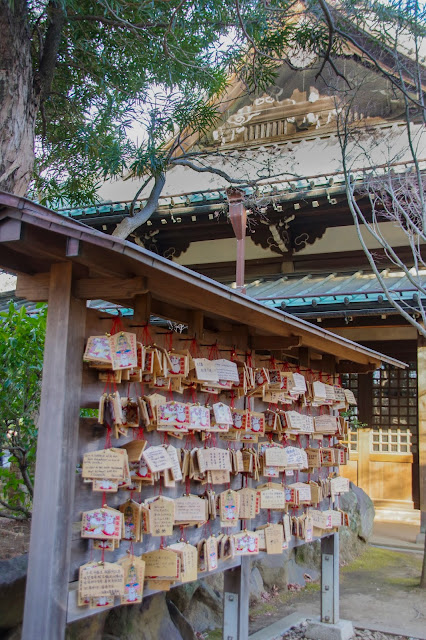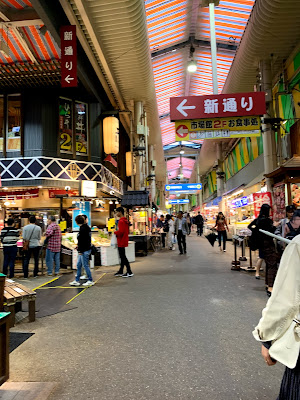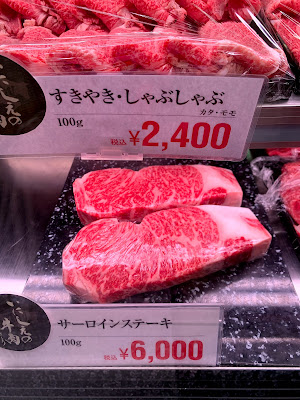
A photo blog from Tokyo. A blog started in 2014 in Chiangmai, then moved to Vientiane, continues now in Japan. Daily photos and some stories to share my life in Tokyo with friends, families and others.
Friday, 28 February 2020
Thursday, 27 February 2020
The neighbourhood - Sazasen
Sazae-san is a character in a Japanese manga series by Machiko Hasegawa from the post war era. While Astro Boy became famous in the west Sazaesan and her family remain unknown. However they are celebrated in Sakurashinmachi, the neighbourhood where the author lived. The characters greet you at the train station and on a mural at the main intersection and cartoon images decorate the power boxes in the street and other places.
Wednesday, 26 February 2020
Winter Break - Nozawa Onsen
Great views form the summit of Mt Kenashi at Nozawa Onsen ski resort. The Sea of Japan is in the far far distance. There are plenty of trees on the mountain, but Mt Kenashi means Mt Hairless.
Tuesday, 25 February 2020
Monday, 24 February 2020
Winter Break - Nozawa Onsen
Back from a four day winter break, where I took the opportunity to visit the Japanese Alps and ski at Nozawa Onsen. Friday was a perfect blue sky day and the snow at the top of the mountain was beautiful, silky smooth powder to glide over. A great day in a gorgeous location - the birthplace of skiing in Japan, 101 years ago. This photo above is looking down over the lower middle third of the mountain, the village is under the mist/cloud and it another mountain range in the distance.
Below is a panaoroma from the other side of the mountain, taken on the amazing Skyline hometrail.
Sunday, 23 February 2020
Friday, 21 February 2020
The Neighbourhood - Queens English
Every neighbourhood has cram schools and English language schools. Love that the one in Sakurashinmachi is called "The Queens English School".
Thursday, 20 February 2020
The Neighbourhood - Round windows
Wednesday, 19 February 2020
The Neighbourhood - Sakura in Sakurashinmachi
Tuesday, 18 February 2020
Monday, 17 February 2020
Winter Coats
Japanese people always look stylish in their winter coats, both men and women and they are usually in subtle colours, grey, fawn and beige.
Not only people have winter coats, but so do the trees, these pine trees in the garden at Nezu museum had cute coats of rice straw.
Sunday, 16 February 2020
Sunday Kimono 14 - At the Art Gallery
The Nezu Museum is one of my favourite places in Tokyo. The last exhibition "Paintings Created as Sets" featured a wonderful 6 panel screen with maple leafs on a gold background, paired with a another 6 panel screen of white cherry blossoms - both my obsessions in two pieces of art.
Next to these was another screen with summer flowers on a gold background. I loved it that this lady in her kimono with a floral themed obi was enraptured with the beautiful art works as I was.
Friday, 14 February 2020
Roses for St Valentine's Day
A short visit to my favourite Tokyo florist - Aoyama Flower Market in Ometosando. It was full of roses (and some dahlias). Beautiful. Happy Valentines.
Thursday, 13 February 2020
More cat good luck
Ema boards with cat images at Gotokuji Shrine. Ema means picture horse. Worshippers write messages for good luck on the boards.
Wikipedia tells me
In ancient times people would donate horses to the shrines for good favor; over time this was transferred to a wooden plaque with a picture of a horse, and later still to the various wooden plaques sold today for the same purpose.Once inscribed with a wish, Ema are hung at the shrine until they are ritually burned at special events, symbolic of the liberation of the wish from the writer.
Wednesday, 12 February 2020
Beckoning Cats
The beckoning cats at Gotokuji Temple in Setagaya (my neighbourhood) are said to bring good luck. Even for me they were cute cats.
The porcelain statues were everywhere and are meant to bring good luck. There are several versions of the history of the shrine and the cats. The temple grounds were peaceful and zen like and cat free.
Tuesday, 11 February 2020
Tuesday Travel Tips 1
Traveling on the Tokyo Metro requires a certain ettiquette. Many train stations have signs explaining how to behave. Here is one, now in English as well, illustrating luggage protocols.
Monday, 10 February 2020
Shichifukujin on a Sunday
Shichifukujin Meguri is the seven lucky gods pilgrimage - a New Year tradition to invite luck into your life.
Of course Mary never arrives on time, so I visited seven shrines a month late!! Sunday I explored shrines in Nihonbashi. The aim is to visit shrines for seven deities.
- Ebisu – the god of prosperity, commerce, and fishing
- Daikokuten – the god of agriculture (hence his being called the “kitchen god”), prosperity, and commerce
- Bishamonten – the god of war who defends humans against evil spirits
- Benzaiten – the goddess of beauty and the arts
- Fukurokuju – the god of wisdom, good fortune, and longevity
- Jurojin – the god of longevity and good health
- Hotei – the god of happiness and good fortune
As I was a month late I missed any English documentation so I not sure I ticked all the deity boxes. It was interesting, especially watching the crowds at Suitengu Shrine which is famous, being visited as a shrine for safe childbirth and blessing for children. and at Koami Shrine Fukurokuju (virtue/longevity) and Benzai-ten (learning/wealth) are worshipped here.
Better late than never - I hope the visits bring me luck for 2020.
- Ebisu – the god of prosperity, commerce, and fishing
- Daikokuten – the god of agriculture (hence his being called the “kitchen god”), prosperity, and commerce
- Bishamonten – the god of war who defends humans against evil spirits
- Benzaiten – the goddess of beauty and the arts
- Fukurokuju – the god of wisdom, good fortune, and longevity
- Jurojin – the god of longevity and good health
- Hotei – the god of happiness and good fortune
Sunday, 9 February 2020
Friday, 7 February 2020
Shotengai - Kanazawa
Thursday, 6 February 2020
Shotengai Kyoto
Wednesday, 5 February 2020
An expensive piece of meat
Stopped to look at the window in a meat shop in Kichijoji shotengai on Sunday afternoon. Here is a marbled piece of steak - maybe Wagu - I don't know. 6000 Yen is $81 AUD - for 100g. The cut behind is obviously lesser quality at only 2400 Yen or $32 AUD for 100g.
Tuesday, 4 February 2020
Peony Tents
The peonies at the Winter Garden in Ueno Park each have their own intricately woven straw home - very cute - to protect them from frost.
Peony and Pagoda
The five storied pagoda at Kaneji Temple in Ueno Park is next to the Peony garden. It gives context to the location of the garden and its importance in the time of the Shoguns. The last Tokugawa Shogun, was defeated in 1868 at the Kaneji Temple.
Monday, 3 February 2020
Sunday in Sunroad Shotengai
Shotengai are traditional pedestrian shopping centres in Japan. Many are covered with glass roof panels, like this one in Kichijoji that I explored yesterday. It is called Kichijoji SunroadThey are usually linear, with side streets and arches at either end and are lined with small stores, 100 yen shops and chain stores along with quirky stalls and interesting food. This one had a retro feel with Nakamichi and Daiyagai are other nearby shotengai - I think they all blended into one another.
Sunday, 2 February 2020
Sunday Kimono 12
I came across this beautiful exhibition of kimonos from hand woven silk in a side street of Ginza on Thursday night. The colours were sublime and silk absolutely beautiful. I couldn't understand the hostess, I thought they said it was from Kyoto, but maybe it was meant to be Koyama?? Google translate didn't help either. However I could read the price tag on some of them 450000- 500000 Yen - that is nearly $AUD 7000. Divine but expensive - now I want to visit a silk weaving village - just like in Laos.
Subscribe to:
Comments (Atom)










































